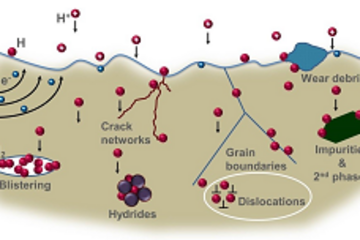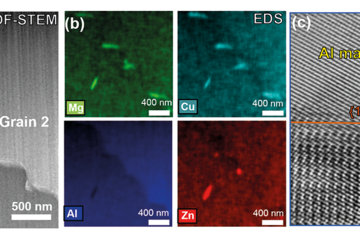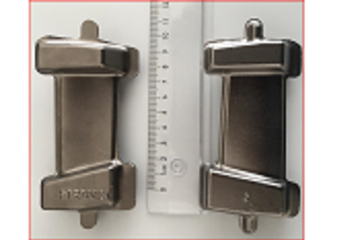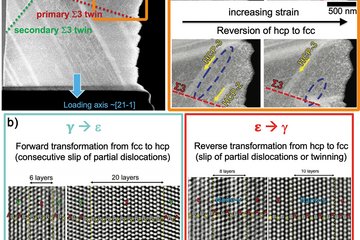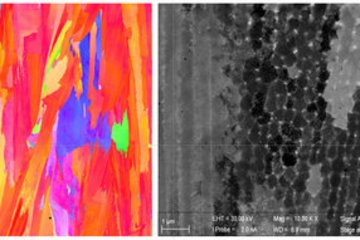All genres
21.
Journal Article
A Mechanical Method for Preparing TEM Samples from Brittle Films on Compliant Substrates. Practical Metallography - Praktische Metallographie 48 (8), pp. 408 - 413 (2011)
22.
Journal Article
Microstructure and adhesion of as-deposited and annealed Cu/Ti films on polyimide. International Journal of Materials Research 102 (6), pp. 729 - 734 (2011)
23.
Journal Article
Adhesion energies of Cr thin films on polyimide determined from buckling: Experiment and model. Acta Materialia 58 (16), pp. 5520 - 5531 (2010)
24.
Conference Paper
Electro-mechanical performance of thin gold films on polyimide. In: MRS Advances, Vol. 1, pp. 773 - 778. Materials Research Society (2016)
25.
Conference Paper
In-situ Tensile Straining of Metal Films on Polymer Substrates under an AFM. 2012 MRS Fall Meeting & Exhibit, Hynes Convention Center, Boston, MA, USA, November 25, 2012 - November 30, 2012. Materials Research Society Symposium Proceedings 1527, (2013)
26.
Conference Paper
Fracture and Delamination of Chromium Thin Films on Polymer Substrates. Symposium on Mechanical Behavior of Nanostructured Materials held at the 2009 TMS Annual Meeting and Exhibition, San Francisco, CA, USA, February 15, 2009 - February 19, 2009. Metallurgical and Materials Transactions A 41 (4), pp. 870 - 875 (2010)
27.
Talk
The mechanical behavior of thin cobalt films on polyimide. Arbeitskreistreffen Rasterkraftmikroskopie und nanomechanische Methoden, TU Darmstadt, Darmstadt, Germny (2015)
28.
Talk
In-situ stress measurements in thin films using synchrotron diffraction. Summer School: Theory and Practice of Modern Powder Diffraction, Tagungshaus Schönenberg, Ellwangen, Ellwangen, Germany (2014)
29.
Talk
In-situ stress measurements in Cu films using synchrotron radiation. "Mechanical Issues for Flexible Electronics" Flex Workshop, Erich Schmid Institut, Leoben, Leoben, Austria (2014)
30.
Talk
Computational simulation of cracking and buckling of thin metallic films on polymer substrate under tensile loading. "Mechanical Issues for Flexible Electronics" Flex Workshop, Erich Schmid Institut, Leoben, Leoben, Austria (2014)
31.
Talk
Effects of the film thickness on the deformation behavior of thin Cu films on polyimide. Arbeitskreistreffen Rasterkraftmikroskopie und nanomechanische Methoden, Max-Planck-Institut für Eisenforschung GmbH, Düsseldorf, Germany (2014)
32.
Talk
Film thickness effects on the deformation behavior of Cu/Cr thin films on polyimide. TMS 2014: 143rd Annual Meeting & Exhibition, San Diego, CA, USA (2014)
33.
Talk
Deformation behavior of a Cr interlayer buried under Cu films on polyimide. GDRi CNRS MECANO General Meeting on the Mechanics of Nano-Objects, MPIE, Düsseldorf, Germany (2013)
34.
Talk
The adhesion of a Cu/Cr film stack on polyimide. EUROMAT2013, Sevilla, Spain (2013)
35.
Poster
In situ investigation of the interlayer dominated failure of Cu thin films for flexible electronic devices. Gordon Research Conference “Thin Film and Small Scale Mechanical Behavior”, Bentley University, Waltham, Waltham, MA, USA (2014)
36.
Poster
Adhesion behavior of Cu–Cr thin films on polyimide substrate. ECI Conference "Nano- and Micro-Mechanical Testing in Materials Research and Development IV", Olhão, Portugal (2013)
37.
Thesis - PhD
The mechanical behavior of thin metallic films on flexible polymer substrate. Dissertation, Ruhr-Universität Bochum, Bochum, Germany (2016)




